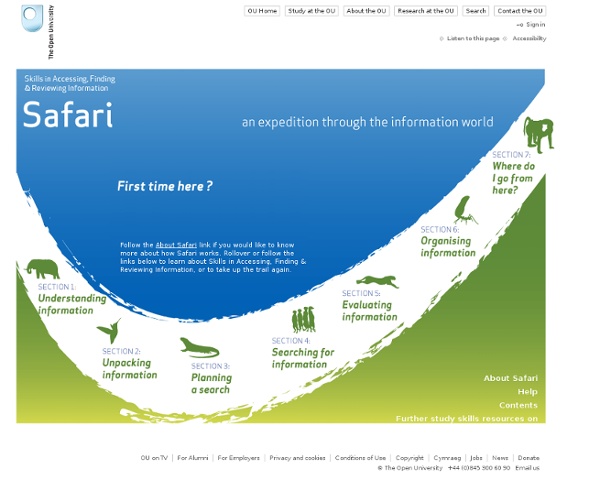Literature Reviews
Sometimes we have problems writing a literature review. There are different styles of review which complicates matters. Some reviews are a critical analysis of key papers in the area, another type of review known as a review paper actually gathers literature over a period (of say 5 or 10 years) and then classifies it and determines research trends and gaps. However, the most common, and the one you are likely to use in your thesis is to analyse the literature related to your particular research questions. Note that I mention research questions! Building a literature review around your research questions gives your literature review immediate structure. The major trap is to try to include everything that you have read. The aim with a literature review is not to have 25,000 words of background material but to have a focused analysis of the work closely related to your topic. What do you do if you haven't got research questions yet?
El Gaviero Periodico Literario
Storyboard That: The World's Best FREE Online Storyboard Creator
anatarambana literatura infantil: articulos
Conocí a Marina García hace muchos años: era una joven arquitecta argentina afincada en Sevilla que hacía libros de arte para niños. La entrevisté para Educación y Biblioteca, en uno de los dossieres que dedicamos al tema de los libros informativos. Esa entrevista puede leerse en este enlace. La mezcla de promoción, difusión, librerías colaborando, presupuestos para cada bolsillo y numerosas recompensas (diseñadas y presupuestadas por ella), así como el compromiso a un posterior envío, me hicieron ver que el autor como editor tiene mucho trabajo, especialmente cuando hablamos de un libro en tapa dura, gran formato, ilustraciones a color y cierta cantidad impresa.
Periodical literature
Periodical literature (also called a periodical publication or simply a periodical) is a published work that appears in a new edition on a regular schedule. The most familiar examples are the newspaper, often published daily, or weekly; or the magazine, typically published weekly, monthly, or as a quarterly. Other examples are newsletters, literary magazines (literary journals), academic journals, and yearbooks. These examples are typically published and referenced by volume and issue. "Volume" typically refers to the number of years the publication has been circulated, and "Issue" refers to how many times that periodical has been published during that year. The International Standard Serial Number (ISSN) is to periodical publications what the ISBN is to books: a standardized reference number. Postal services often carry periodicals at a preferential rate; for example, Second Class Mail[4] in the United States only applies to publications issued at least thrice per year.
Buque de Arte: Wislawa Szymborska: Discurso de recepción del Premio Nobel de Literatura, 1996
Se dice que en un discurso lo más difícil es siempre la primera frase... Pues ya la dije... Pero presiento que las que siguen van a ser igualmente difíciles, la tercera, la sexta, la décima, hasta la última, ya que debo hablar sobre poesía. El poeta contemporáneo es escéptico y desconfía incluso -o más bien principalmente- de sí mismo. No existen profesores de poesía, lo que haría suponer que esta actividad requiere de estudios especializados, exámenes presentados en fechas precisas, disertaciones teóricas rematadas con bibliografía y notas y, finalmente, los diplomas recibidos con solemnidad. En países más dichosos, donde la dignidad humana no es transgredida tan fácilmente, los poetas, obviamente, quieren ser publicados, leídos y entendidos, pero ya no hacen nada o casi nada en su vida cotidiana para destacar entre la gente. Hay algo que resulta muy característico. El peor de los casos es el de los poetas. He mencionado la inspiración. La gente así es bastante escasa. Subir
A Great Study Skills Poster for Your Class
Learning is a lifelong process. It is also an ongoing experience in which we get to discover new and inspiring things about our world. Some argue that with maturity comes mindful and conscious learning but regardless of age variable, thinking about learning from a metacognitive perspective (thinking about how we learn what we learn) does definitely improve the way we learn. In the visual below created by Create Innovate Explore, Rachel dissected the metathinking levels of studying and provided some of the tips on how to hone in one's study skills. I invite you to have a look and share with your students.
Reading and Remembering
Summary of this page How do you manage to get through your reading, and retain what you have read? Always remember: academic material is not meant to be read. It is meant to be ransacked and pillaged for essential content. Be selective. How do you remember what you have read? One of the basic principles of memory is that the quality of memory is related to the quality of your interaction with what you are trying to remember. Consider this: why is it so easy to remember the contents of an article about something you are really interested in? Learn to use your own cognitive strengths—visual, oral-aural, systematic, etc. A final hint—don't take notes whilst you are reading. There is another bonus: you will find that by reading in anticipation of writing a summary, your reading improves by becoming more analytical and conscious of ‘key points’. The Academic Skills team run workshops during semester which will help you develop your reading and memory techniques. The problem
justo cuando me supe las respuestas de la vida,



